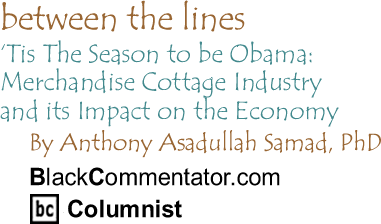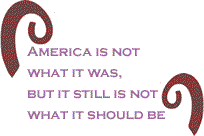
|
|||||||||||||||||||||||

|
||

Custom Search
|
||
 |
||
Barack
Obama’s election to the Presidency of the United States has had
a residual effect on the economy in ways that are not (yet) reflected
on the New York Stock Exchange. Barack Obama merchandise is huge.
T-Shirts, hats, buttons, coins, photos, posters, calendars, bobble
head dolls and other paraphernalia has created a cottage industry
that has moved money through the economy in ways not even flat screen
televisions have. There appears to be a merchandizing product segment that has found very creative ways to tap into Obama-mania, ready to supply an all-too-eager consumer market. Just when you thought there were no new ways to separate poor people (not just black people) from their money, the popular effects of what the Obama election means to people reflects the impact of popular culture on this Presidency. From “Obama Girl” to Tina Fey, pop culture elected Barack Obama. Now pop culture is profiteering on Obama. This holiday season, “‘tis the season to be Obama.” Fa-lalalala. A friend of mine dropped Barack Obama money in my mail box last week. The Obama bills replaces George Washington on the one dollar bill. His notion being that the first President should be replaced by the first black President. Of course this is not legal tender, or even legal, but this just shows the depth and breath of excitement around this historical event. Those million small donors who gave Barack $80 a pop (on average) are now spending $80 on sequenced, designer t-shirts, $50 on limited edition Obama one dollar gold coins, and $20 on reprints of election day newspapers. This is history, and people want to touch it, feel it, wear it and romanticize it. This icon-ization of Barack Obama is also feeding the persona in ways that will make the expectations his Presidency difficult to fulfill. That doesn’t make it any less exciting. That’s how they know black people have money. We buy what we want, and often beg for what we need. And we want a piece of Barack right now. The accomplishment, in and of itself, makes Obama bigger than life. They burned Beatle records when John Lennon once said the Beatles were “bigger than Jesus.” What he meant was that, to young people, the Beatles represented a new type of hope in a depressed nation that had photos Jesus, and an assassinated JFK on their walls, that came down when posters of a new visual reality came about. Pop culture phenomena often are direct reflections of our socio-political realities. That’s what we are witnessing in this Obama-mania. America has turned a corner, of sorts, in a way that people still can’t believe.
We can buy into to some things, but not visual realities that represent incomplete hopes and dreams. Or else, how do we project where all of this ends? Yes, we can project Barack in the grandness of accomplishment, but we must project Obama in a vision of completeness. His finality must be in the context of fulfillment, not tragic unfulfillment.
No, the election of Barack Obama is a real demonstration that America
is not what it was, but it still is not what it should be. Obama
is just a visual reflection of what America can become, at this
point. It is up to the rest of society to help him fulfill the hope
and promise of America. Not as a poster on a wall, or a picture
on a t-shirt, but as a reality in the quality of each of our lives.
‘Tis the season to be Barack-ky. Wear him proudly, but with the substance of a historic completion in mind. Let the economic impact move past trinkets and tragic symbolism. BlackCommentator.com Columnist, Dr. Anthony Asadullah Samad, is a national columnist, managing director of the Urban Issues Forum and author of Saving The Race: Empowerment Through Wisdom. His Website is AnthonySamad.com. Click here to contact Dr. Samad. |
||
Any BlackCommentator.com article may be re-printed as long as it is re-printed in its entirety and full credit given to the author and www.BlackCommentator.com. If the re-print is on the Internet we additionally request a link back to the original piece on our Website. Your comments are always welcome. eMail re-print notice
If you send us an eMail message we may publish all or part of it, unless you tell us it is not for publication. You may also request that we withhold your name. Thank you very much for your readership. |
||
| |
||
| December 4 , 2008 Issue 302 |
|
| Executive Editor: Bill Fletcher, Jr. |
| Managing Editor: Nancy Littlefield |
| Publisher: Peter Gamble |
| Est. April 5, 2002 |
Printer Friendly Version
in resizeable plain
text format or pdf
format. |
| Frequently Asked Questions |
 |

|
 |
 |
 |
| |
| |






























 But
we all must be careful not to allow Barack Obama to be canonized
and even martyr-ized before he has a chance to make his impact on
American society. On every street corner, he’s already in photos
with John F. Kennedy and Martin Luther King, Jr. What does that
signal? I went in Roscoe’s Chicken and Waffles the other day, and
there is Barack Obama as Abraham Lincoln, “the Great Emancipator.”
I don’t know what being pictured with Abraham, Martin and John signals
to you, but it signals to me all men who met tragic ends before
the significant impacts they made on American society were completed.
But
we all must be careful not to allow Barack Obama to be canonized
and even martyr-ized before he has a chance to make his impact on
American society. On every street corner, he’s already in photos
with John F. Kennedy and Martin Luther King, Jr. What does that
signal? I went in Roscoe’s Chicken and Waffles the other day, and
there is Barack Obama as Abraham Lincoln, “the Great Emancipator.”
I don’t know what being pictured with Abraham, Martin and John signals
to you, but it signals to me all men who met tragic ends before
the significant impacts they made on American society were completed. Slavery
may have ended with Lincoln’s death, but semi-slavery (legal segregation)
was back 30 years after his death. JFK may have first introduced
affirmative action and the first legitimate civil rights bill of
the 20th Century, but it could only be passed in his death and affirmative
action was, by and large, dead 30 years after his death. Martin
Luther King, Jr. may have brought an end to legal segregation and
inspired a voting rights act, but de facto segregation still exists
and voting rights protections still have to be renewed every twenty
years, forty years after his death. The hopes and dreams of all
these men are largely unfulfilled.
Slavery
may have ended with Lincoln’s death, but semi-slavery (legal segregation)
was back 30 years after his death. JFK may have first introduced
affirmative action and the first legitimate civil rights bill of
the 20th Century, but it could only be passed in his death and affirmative
action was, by and large, dead 30 years after his death. Martin
Luther King, Jr. may have brought an end to legal segregation and
inspired a voting rights act, but de facto segregation still exists
and voting rights protections still have to be renewed every twenty
years, forty years after his death. The hopes and dreams of all
these men are largely unfulfilled.






